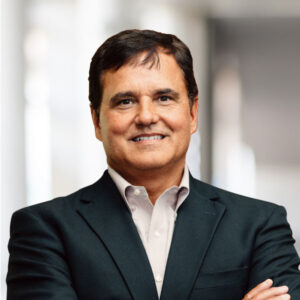As one fiscal year closes, and a new one begins, Todd Sherer, Associate VP for Research, Executive Director of Emory OTT, reflects on what the office has achieved and what we’re looking toward in the future.
Thinking back on Fiscal Year 2023, what accomplishments stand out to you most?
Three big things stand out. One is Emory’s crossing the billion-dollar threshold in sponsored research. While OTT doesn’t directly submit grants and contracts, we do help to enable research through our processing of material transfer agreements (MTAs) and data use agreements (DUAs). We also provide consultation on research grants, and contracts, and IP issues. So, I very much feel we played a role in this huge achievement for Emory and beyond. Another thing I’m incredibly proud of is our being ranked number two in the AUTM licensing survey for licensing revenue. Finally, Emory was ranked number three in discovering public sector research institutions by the Journal of Technology Transfer. There’s a lot to be proud of for this year.

Todd Sherer, PhD
On the smaller side of things, we improved our processes in several key ways. One of those was to expand the contractConnect portal, so that we could also receive submissions from the researchers all types of MTAs and DUAs. This allows us to reduce time spent on data entry and helps reduce any errors associated with it.
Lastly, after a conversation with campus-wide stakeholders, we found a way to streamline outgoing DUAs; instead of each school processing the agreements, OTT will handle them. While this increases the number of contracts for our office, it simplifies the process and puts DUAs in the hands of people who specialize in the issues involved in that kind of contract.
You previously wrote about the innovation ecosystem at Emory. How do you think it’s changed this year? How do you hope that it evolves in the coming year?
The innovation ecosystem has grown with the creation of the Emory Drug Development Fund. It’s still emerging, but it has started to make funding decisions for new research. What’s neat about this fund is that its resources come from licensing revenue from molnupiravir. We’re now taking that licensing revenue and putting it back into promising drug and therapeutic research and discovery so we can continue to have a real impact on patient care.
Additionally, we’re almost finished with our inaugural year of the Female Founders Forum at Emory (F3@E). This is an important addition to the Emory innovation ecosystem because it is a robust, direct effort to increase diversity and inclusion in innovation – in this case, it’s targeted at women scientists and clinicians. Associated with F3@E is WIN, the Women in Innovation Network. Each quarter, we invite female entrepreneurs in the life sciences community to speak about business ownership, raising money, and starting companies. It’s an invaluable resource for the research community at Emory.
In what ways are you hoping to see improvement in the next year, FY24?
The biggest thing I’d like to do is build upon the momentum that we achieved because of the expansion of our staff. In FY23, we had a brief but substantial turnover on the licensing team, but we also added three new positions to our staff. So, while a significant portion of our licensing team is relatively new and we are still investing resources in training our new staff members, I’m looking forward to hitting the ground running in FY24 with a team that’s had time to work together and get familiar with the Emory way.
What are you most looking forward to as we head into a new fiscal year? Do you have any New Fiscal Year’s resolutions for the office?
I hope our team can implement some important process and workflow improvements. For example, we’ll be trying out a new effort for MTAs and DUAs. When we picked up outgoing DUAs from the schools, it added another 100 to 200 agreements to our already stuffed queue. But taking inspiration from Massachusetts General Hospital, we’ve found a simplified approach to low-risk DUAs. Essentially, it puts the responsibility of processing the agreements on the research team, who then can send us an agreement that’s ready for final signature. This would reduce our processing time of those outgoing, low-risk DUAs from several weeks down to 24 to 48 hours.
In terms of workflow, we’ve engaged Tremonti to help us in a portfolio cleanup effort. This will help us determine which technologies we can close out for more space in our pipeline. Thinning out our queue is an important action to improve efficiency, but it’s often deprioritized in favor of our active technologies. So, a little “spring cleaning” will help us be more proactive and lead-focused for our workflow.
Anything else you’d like to add?
The last thing is that we are evaluating our resources in the artificial intelligence (AI) space. Because of Emory’s aggressive goals to expand its presence, research effort, and faculty focused on AI, we’re expecting that to be a real growth area for OTT.
In FY24, we’ll be preparing for that growth. We’ve identified a few law firms with expertise in this space so that we’ve got a partner that can both continue to educate us and help with overflow work. We’ll also proactively try to collect a cadre of AI industry experts so we can more readily vet new technologies in that space.
I expect this to be concluded over FY24, when we’ll determine what we need to do to get prepared for the rise in AI technologies. We want to be ready to meet expectations, to handle any increased volume we would see in disclosures, and to effectively market and license technology in that emergent space.